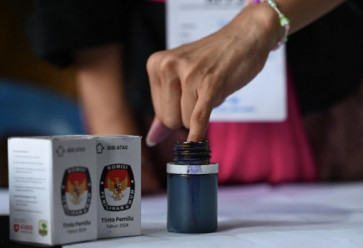Vaccination needed as budget not enough to boost recovery
Indonesia’s budget deficit soared to a record Rp 956.3 trillion (US$69.07 billion) last year as the coronavirus pandemic fueled enormous government spending while tax revenue plunged.
Change Size

I
ndonesia’s economic recovery should not only depend on government spending as it will not be sufficient to compensate for the slowing economic activity caused by the coronavirus pandemic, a minister said Wednesday, as the 2020 fiscal deficit reached a record high.
Finance Minister Sri Mulyani Indrawati highlighted the extraordinary level of money that had been poured into the economy last year to anchor business activity and combat the virus, warning that the state budget had a limitation and could not act alone in rescuing the economy.
“We realize that economic recovery should not and will not only depend on the state budget, as it will not be enough to compensate for [falls in] consumption, investment and export activity,” she said in a press briefing on Monday. “We need reform to attract investment […] and mass vaccination to build confidence that will speed up domestic consumption recovery.”
Indonesia’s budget deficit soared to a record Rp 956.3 trillion (US$69.07 billion) last year as the coronavirus pandemic fueled enormous government spending while tax revenue plunged as households and businesses struggled with the pandemic-induced economic downturn.
The deficit, which is equal to 6.09 percent of the country’s gross domestic product (GDP), underscores economic challenges faced by Indonesia as it tries to emerge from its first recession since the 1998 Asian financial crisis. The figure is also nearly three times as large as the Rp 348.7 trillion deficit in the 2019 fiscal year.
The government issued a government regulation in lieu of law early last year, which was approved into law by the House of Representatives later in the year, to enable the state budget deficit to widen beyond the previous legal limit of 3 percent of GDP as a response to the outbreak. It aims to bring the deficit cap back to 3 percent in 2023.
“The state budget will continue to support economic recovery but we will look to maintain the health of the budget going forward,” Sri Mulyani stressed. “Therefore, the plan to reduce the extraordinary fiscal spending must be prepared thoroughly in 2021 and 2022.”
The government spent Rp 2.58 quadrillion last year, up 12.2 percent year-on-year (yoy) and around 94 percent of the government’s target, to fund development projects, combat the virus as well as provide relief for households and businesses. The government spent Rp 579.8 trillion, or 83.4 percent of the Rp 695.2 trillion national economic recovery program budget.
On the other hand, the government collected Rp 1.63 quadrillion in state income last year, a sharp drop of 16.7 percent yoy and around 96 percent of the government’s target, as income from taxes plunged due to slowing economic activity and the rollout of several tax stimuli.
The government issued Rp 1.17 quadrillion worth of sovereign debt papers last year, up 163.8 percent compared to the previous year, causing the government debt to soar to 38 percent of GDP from 30 percent in 2019.
The finance minister added that as the recovery continued, the fiscal picture would improve as people began spending more money and companies started to expand operations.
The state budget deficit is expected to reach Rp 1 quadrillion, or 5.7 percent of GDP, this year as the government prepares Rp 2.75 quadrillion in spending to fuel the virus-battered economy.
“Although the pandemic has worsened the fiscal conditions, our debt-to-GDP ratio remains relatively better than other emerging countries,” Bank Central Asia (BCA) economist David Sumual told The Jakarta Post on Wednesday. “Despite that, the government should ensure that extraordinary fiscal policy will only be temporary to ensure stability.”
He conceded that running on huge deficits had become the new norm in the world with Indonesia’s fiscal picture remaining relatively better than other countries.
“Successful pandemic containment and vaccination program will bolster domestic consumption and support economic growth to at least 4 percent this year," David said.
Bank Danamon economist Wisnu Wardana wrote in a note on Wednesday that his team believed the government should front-load its expenditure to help support economic recovery in 2021.
“We are cautiously optimistic about this year’s spending considering the recent Cabinet reshuffle,” which might slow government spending, he went on to say.









